Photo: Courtesy of the Recording Academy
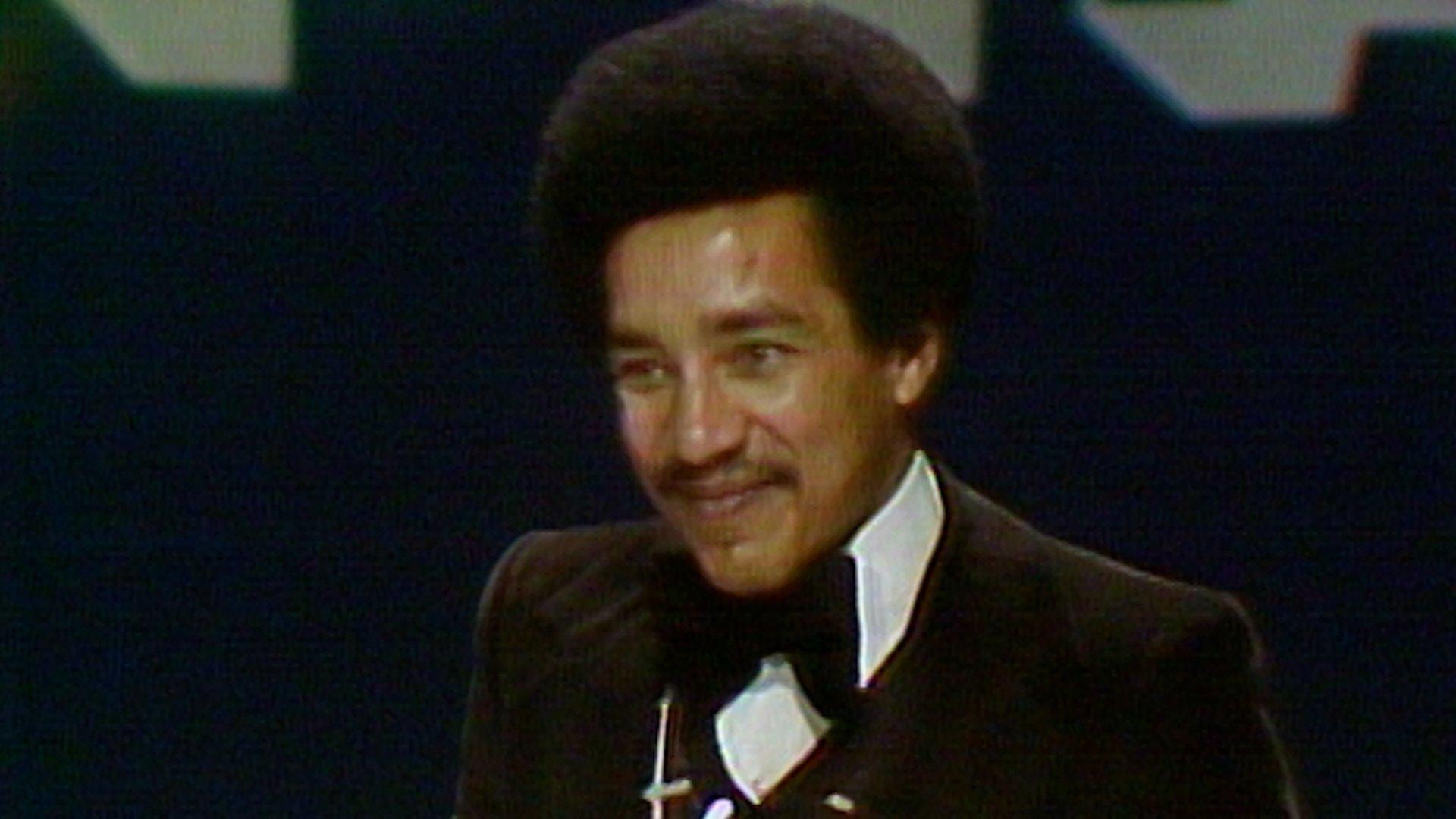
video
GRAMMY Rewind: Smokey Robinson Accepts A GRAMMY On Behalf Of The Temptations In 1973
Motown legend Smokey Robinson filled in after fellow label icons the Temptations won a golden gramophone for "Papa Was a Rollin' Stone," and took a moment to celebrate the group's "fantastic" achievements.
Since its premiere in October 1972, "Papa Was a Rollin' Stone" remains one of the highest-performing singles in the Temptations' catalog — and one of Motown's timeless classics. The song quickly rose to the top of the Billboard Hot 100 chart at the end of 1972, and snagged the group two GRAMMY wins at the 1973 GRAMMYs.
In this episode of GRAMMY Rewind, Motown legend Smokey Robinson takes the stage to accept the Temptations' award for Best Duo/Group R&B Vocal Performance at the 15th GRAMMY Awards. Robinson was a longtime collaborator of the group, writing some of their most notable hits, including "My Girl," "The Way You Do the Things You Do" and "Get Ready."
"I would like to say it's a great pleasure for me to come and accept this award for the Temptations, who have always been fantastic and are doing special, fantastic things," Robinson praised, alluding to their "musical marriage" to songwriter and producer Norman Whitfield.
Press play on the video above to watch Smokey Robinson accept the Temptations' golden gramophone for "Papa Was a Rollin' Stone" at the 1973 GRAMMYs, and keep checking back to GRAMMY.com for more new episodes of GRAMMY Rewind.
A History Of Casablanca Records In 10 Songs, From Kiss To Donna Summer To Lindsay Lohan
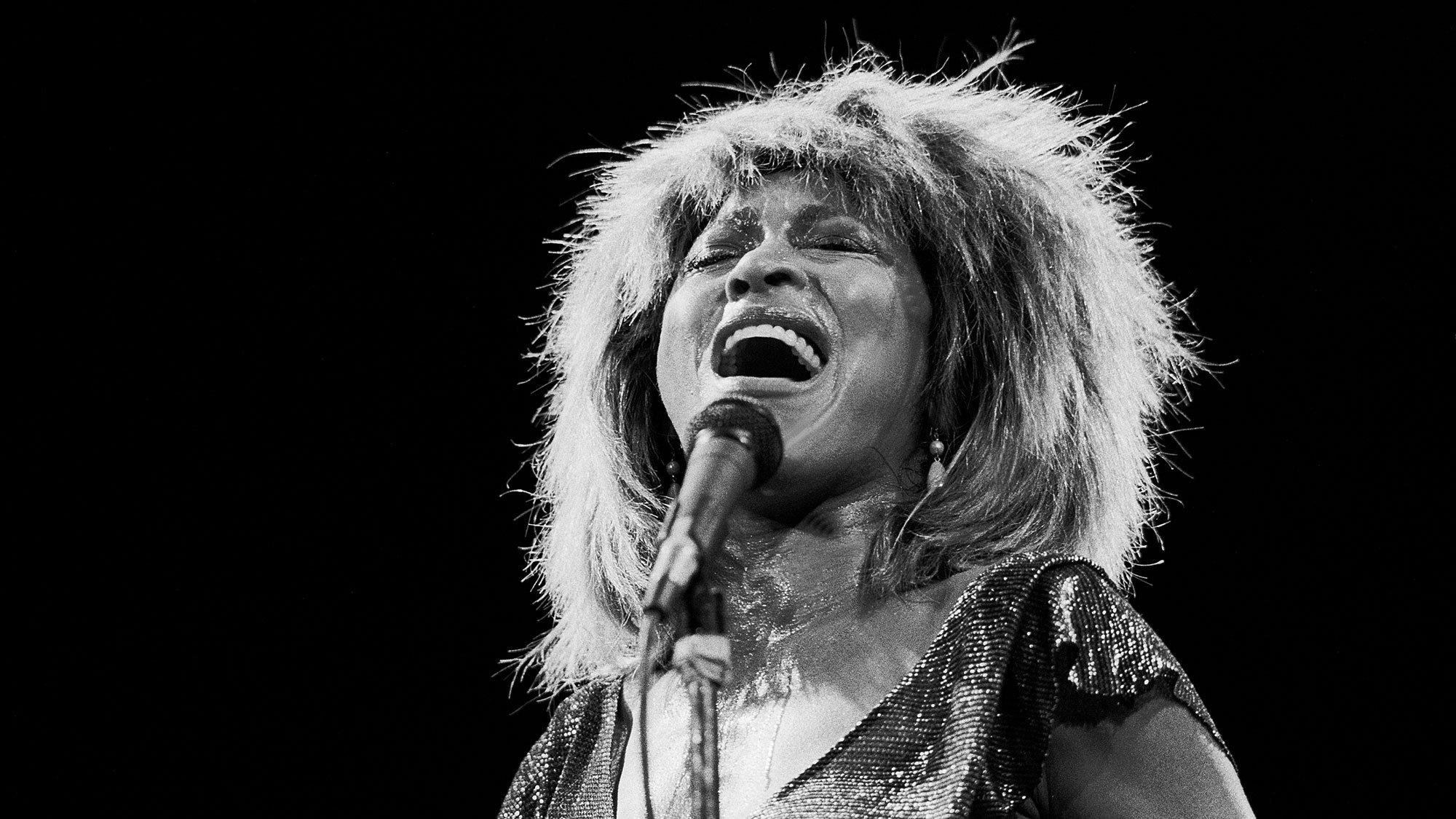
Photo: Paul Natkin/GettyImages
feature
Revisiting ‘Private Dancer’ At 40: How Tina Turner’s Liberation Album Remains A Musical Salvation
Released in May 1984, ‘Private Dancer’ was a musical tour de force. The record saw Tina Turner shed her assured vocal talents, exposing some fragility while adding in some sultriness too, to share a powerful tale of finally finding liberation.
“How it all came about was a miracle,” says Terry Britten, the co-writer and producer of Tina Turner’s “What’s Love Got To Do With It.”
The enduring single on Turner's 1984 album Private Dancer, released 40 years ago this month, was the songstress' ultimate emancipating act. It liberated her from the strictures of a music career bound to former husband Ike Turner, and debuted a new, self-possessed persona that highlighted her own rich talents as a solo artist. Decades on, the album remains a searing testament to resilience and the power of raw, honest expression.
Private Dancer, her fifth solo outing, was the beginning of Turner's renaissance and next era. Still, some of its most powerful songs — including “What’s Love” — almost didn’t make the cut. In fact, the song’s woeful quality and halted vocals proved an obstacle for Turner.
“After all this time, I’ve realized what the problem was and why she didn’t like it: because she was so damn vulnerable in it,” Britten tells GRAMMY.com. “She’d never been that vulnerable before in a song.”
Turner had long wrestled with her public image and allowing listeners into her inner world. Despite her success in the '70s and the subsequent 1976 breakdown of her abusive marriage to Ike (which left her penniless), followed by less successful Las Vegas revue shows, Turner was wary of conceding defeat.
Her career revival was largely born after Turner had made a cameo appearance in 1982 on the synth-inspired remake of The Temptations' “Ball of Confusion.” Masterminded by pop band Heaven 17’s Martyn Ware, the song netted Turner a singles deal with Capitol Records. Her next pairing with Ware, a remake of Al Green’s “Let’s Stay Together,” was a runaway success, charting at number six in the UK and No. 26 on the Billboard Hot 100, in late 1983 and early 1984 respectively.
Chart success had eluded Turner for years, so by February 1984 Capitol quickly demanded a full album — with two weeks to deliver it. With Turner already on tour in the UK then, her manager, Roger Davies, raced around London seeking potential tracks. Davies had been old friends with Britten back in Australia, and reached out about available songs.
Co-written with Graham Lyle, Britten's "What’s Love” had been skipped over by British rock singer Cliff Richard. Its rumination on sexual over romantic desire awaited a new voice.
Turner's powerhouse vocals gave the track the justice it so called for. Just as her vocal prowess was put on display, "What's Love" also underscored Turner's ability to bring both fragility and sultriness to a song. The combination would soon propel Turner to worldwide domination.
In the studio, Britten leaned on Turner’s dancing background to make the meditative ballad work. Turner struggled with the song’s languid rhythm, so Britten suggested she jog on the spot. “We jogged at the mic,” he says. “Soon enough, she got it!”
Britten believes “What’s Love” showed Turner, for the first time, how empowering vulnerability could be. “She realized she could act out these songs,” he reflects. “The whole direction of her career changed in that moment.”
Released in May 1984, “What’s Love” slowly scaled the charts, competing for prime position with the likes of Prince’s “When Doves Cry” and Lionel Ritchie’s “Stuck on You.” “What’s Love” ultimately landed at No. 1 in August 1984 — staying there for three weeks — and fast-tracked Turner’s forceful musical renaissance.
The arrival of Private Dancer only galvanized the transformation.
The album was a mixture of old and new, figuratively stitching together a reinvigorated yet still rock ’n’ roll Turner. There were completely new tracks and sounds, like the synth-infused “What’s Love” and spunky, pulsating “Show Some Respect” (another Britten number). Covers of the Beatles’ “Help!” and David Bowie’s “1984,” meanwhile, were reimagined with searching gospel energy and symphonic orchestral strings.
There was an emphasis on storytelling across Private Dancer, with lyrical explorations of respect, love, and desire, paired with Turner’s frayed timbre. “I Might Have Been Queen” was penned by Jeannette Obstoj and Rupert Hine in response to hearing Turner’s life story. From a youth picking cotton in Tennessee to her years as a double act with Ike, Obstoj took Turner’s trying life (and lifelong interest in Ancient Egypt) to craft an earthy narrative textured by stories of grief and self-understanding. The stomping funk result was an anthemic tribute, celebrating Turner as she sang proudly of being a “sole survivor.”
Allowed into Turner’s inner sanctum, listeners could better understand and relate to the singer’s past life — whether these were real stories or imagined tales. Songs like “Private Dancer,” seemingly about a dancer who keeps a firm psychological distance from her job as a means of self-protection, couldn’t help but be tied back to Turner’s former life as the mistreated singing partner to Ike. Turner’s coarse vocals — retelling regret with the ballad “Better Be Good to Me,” or celebrating self-confidence on “Show Some Respect” — underscored her toughness as she sang about respect and recognition.
Tina Turner’s emotional depth and lyrical confessions resonated with critics and listeners, affirming Turner as sensitive, soulful and, above all, an iconic solo artist. The success of the record at the 1985 GRAMMYs only affirmed Turner's status.
Britten, who won two gramophones for his work and joined Turner on stage to collect the GRAMMY for Record Of The Year, said that the audience — there and even at home watching — manifested her three wins that night. “In between introductions, you could hear the whole crowd going, ‘Tina! Tina! Tina!’” he says. “It was like the whole auditorium wanted her to win. In fact, they willed her to win.”
The entire musical project was a frenzied worldwide phenomenon: the confident comeback story of a 45-year-old liberated woman. Private Dancer represents a rare redemption for a female artist over 40 — a script contemporaries have taken cues from.
Madonna enjoyed a return serve with her revealing 1998 spiritual album Ray of Light, a record that saw her achieve renewed commercial success — and perhaps most important to her, critical acclaim. After the abject failure of 2001’s Glitter, Mariah Carey stormed the charts (and GRAMMYs) in 2005 with her confessional but defiant album, The Emancipation of Mimi. Janet Jackson, no longer suffering public shame after the infamous Superbowl incident and finally free to release music under her own label, returned revealing a more mature, reflective artist with 2015’s Unbreakable. Each album privileged some aspect of self-exposure and sonic difference to mount a comeback where audiences were invited in.
Publicly sharing some vulnerability while also celebrating fortitude, continues to enliven the story of Private Dancer — and the listening experience decades on. After Tina Turner's death in 2023, critics reappraised the record and the seismic impact of “What’s Love.” Some said the song was an enduring “call to action” on finding independence, while others concluded that Private Dancer alone “lifted [Turner] into the pop stratosphere.”
The record represents one of history’s greatest musical comebacks. Its emotional depth, paired with a tough if sometimes frayed sound, gave listeners a deeply resonant tale about overcoming.
“She gave me such trust,” Britten says of recording with Turner. “I can’t tell you what a moving experience it was.” With Private Dancer, Turner entrusted listeners with her own vulnerable admissions, many of which continue to resonate and inspire today.
Remembering The Artistry Of Tina Turner, "The Epitome Of Power And Passion"
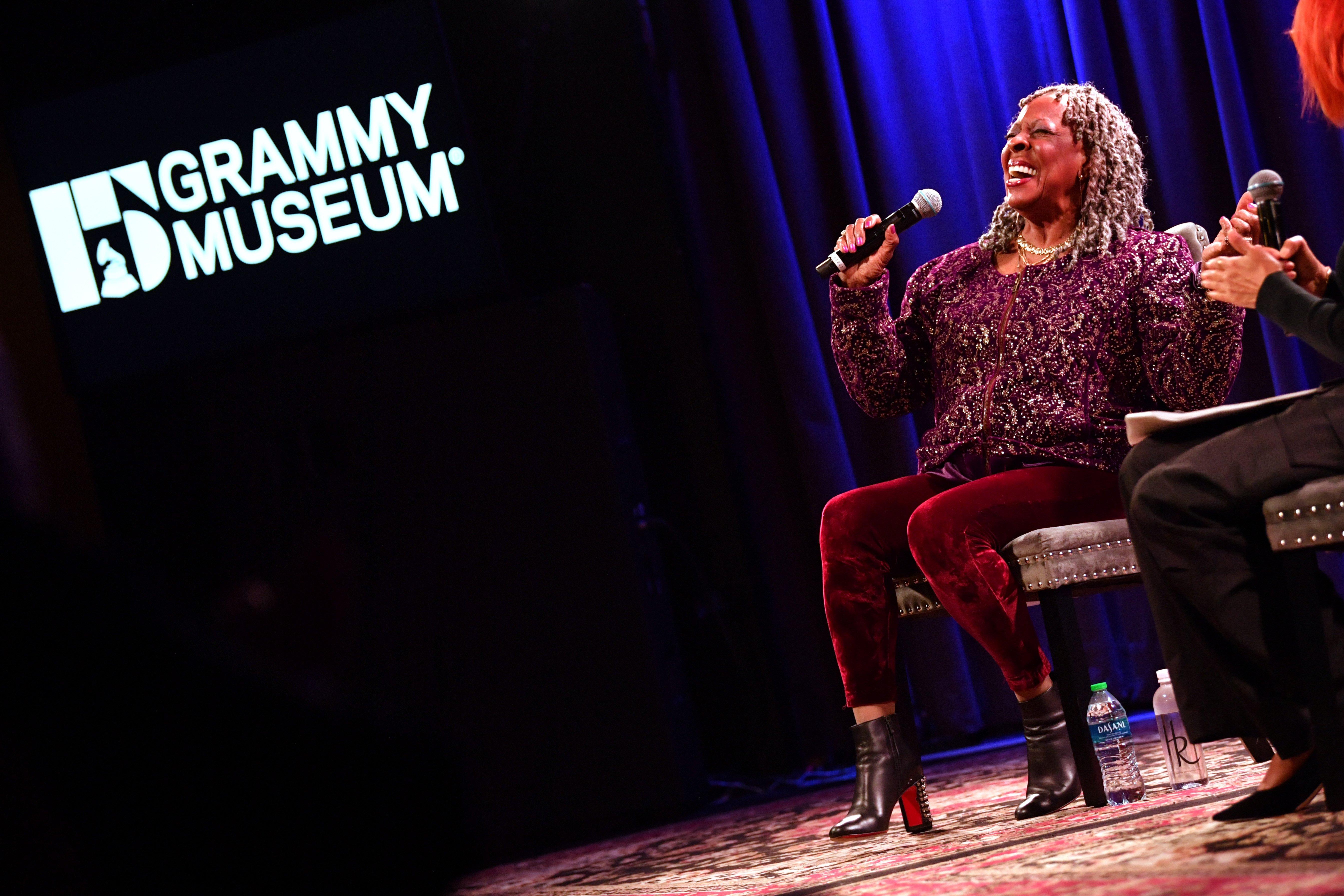
Photo courtesy of the Recording Academy™️/photo by Sarah Morris, Getty Images© 2024.
list
Martha Reeves Takes L.A.: The "Queen Of Motown" Shares Memories Of Smokey Robinson, Her Solo Career & Finally Receiving A Hollywood Star
During "A Conversation With Martha Reeves" at the GRAMMY Museum, the Motown legend sang, laughed and got emotional as she strolled down memory lane — and over to the Hollywood Walk Of Fame, where she recently received a star.
Motown legend Martha Reeves had quite a day.
On March 27, the 82-year-old singer finally got a star on the Hollywood Walk of Fame. Flanked by Stevie Wonder, Smokey Robinson, and Berry Gordy, Reeves donned a pearl and gold strapless gown with a show-stopping hat for the celebration. That evening, Reeves was the star of a conversation at the GRAMMY Museum in downtown Los Angeles.
Reeves was definitely riding high that night. "I’m gonna try to calm down. I’ve been excited all day," Reeves told moderator Gail Mitchell, longtime Billboard Executive Director of R&B and Hip-Hop.
Born in Alabama but raised in the Motor City, Martha Reeves was the lead singer of Martha Reeves and the Vandellas. The Motown girl group is responsible for 1960s and 1970s classics such as "Dancing in the Street," "My Baby Loves Me," "Jimmy Mack," "Nowhere to Run," "(Love is Like a ) Heatwave," and "Bless You." Following her time at Motown, Reeves went on to have a solo career and was even an elected councilwoman in Detroit. The GRAMMY-nominated artist was inducted into the Rock and Roll Hall of Fame in 1995.
Throughout the evening, the Motown diva — now in a lavish purple and silver top — had the audience at the Museum's Clive Davis Theater singing along to her classics, laughing as she strolled down Motown memory lane, and even tearing up as she got personal. She even teased that she might have a new album in store.
Read on for five things we learned from Martha Reeves' free-flowing, laugh-filled conversation at the GRAMMY Museum.
She Had To Fight To Get Her Hollywood Star
Reeves crossed paths with many legendary names over the course of her career. But one of the first people she shouted out wasn’t a star, but her manager Chris Roe. "He’s brought me a long way in just a couple of years." Reeves said of the industry veteran. During the Q&A segment of her conversation, Reeves even brought Roe on stage.
Her gratitude makes sense for a number of reasons. Reeves was first nominated for a star on the Hollywood Walk of Fame in 2021 but the process stagnated, Roe said, because of representation that wasn’t truly in Motown singer’s corner. Reeves' management at the time, Roe noted, was treating the soul icon like a shiny trophy rather than an active musician.
The two first met when Roe was in Detroit on business; a year later Roe went all in to raise money and make her Walk of Fame star dream a reality. Onstage at the Museum, Reeves recalled walking down Hollywood Boulevard with her son in the 1970s (Reeves moved to L.A. for a time when Motown relocated to Southern California), reading the names of the stars. Her young son said Reeves should have her own marker, and his poignant memory was finally brought to fruition.
Martha Reeves Credits Berry Gordy And Motown For Having "A Vision"
"How did Berry Gordy manage to get all of those people in one place? It was like corralling in a Western," Reeves said of Motown's incredible roster of talent in the '60s.
She added that, never in her wildest dreams, did she think she would soar so high alongside musical geniuses like Smokey Robinson and songwriting/production team Holland-Dozier-Holland (who arranged songs for the likes of the Four Tops and the Supremes during a piping-hot run during the mid-1960s).
Occasionally, instead of answering questions, Reeves would burst into song. "I can’t describe it," Reeves said at one point while describing Motown's musical resonance. "But I can make you feel it."
Reeves noted that it was tough to think of one particular moment that wasn’t exciting or that paved the way for future success. She calls everything an "adventure or a challenge."
She did say that her first tour was grueling, consisting of 94 one-nighters and only one motel chain who would allow Black guests.
She Learned A Lot While On Tour With Motown
Reeves went from playfully talking about how "fine" Marvin Gaye was and being around different kinds of artists on cross-country Motortown Revue bus trips, to more serious topics like the integration of Black music during the turbulent 1960s.
She recalled a particularly harrowing moment when the Revue arrived in Montgomery, Alabama in 1963 when the Vandellas, the Marvelettes, the Miracles, the Temptations, and others were performing for a segregated audience in a horse-training arena with American and Confederate flags. While Smokey Robinson and the Miracles performed "Mickey’s Monkey," men with baseball bats separated the audience — Black on one side, white on the other.
But Robinson stepped to the microphone and challenged convention. He just wanted to make sure that everyone just had a good time and could dance. "We’ve come a long way. Music is the reason," Reeves told the audience.
She Remembers Her Solo Work Fondly, Too
After Reeves and the Vandellas disbanded and Reeves left Motown, she released her eponymous debut solo album in 1974 on MCA Records. Producer Richard Perry came in to work on the album with her, resulting in many hits.
Reeves spoke a lot about one track, "Many Rivers to Cross," which involved 110 takes and a 40-piece choir. "He was that diligent in getting the sound he wanted. [A] very profound producer," Reeves said of Perry. Reeves said she's very proud of "Dixie Highway," an ode to Reeves’s Alabama root.
Reeves said that her mother and father — who had 11 children — taught her "everything" and that she was a very loved child. In fact, her parents fostered her musical talents from an early age, her mother helping with her singing and her father putting her on his lap as he played guitar.
Reeves Gave Her Hometown Love, And They Gave It Back
Reeves served as an elected councilwoman in Detroit from 2005 to 2009. "You have to be careful what you ask for," Reeves said with a laugh about her time in politics. She calls the whole experience "an education."
Because of Reeves’s efforts in local politics, Detroit is home to Berry Gordy Jr. Boulevard, the street on which, fittingly, the Motown Museum is located.
Some of her fans and friends from Detroit made it all the way to the GRAMMY Museum for the event, donning Martha Reeves shirts and carrying Vandellas records. Several times, Reeves shouted out a friend who is a dance teacher. "I love you so for being here."
Some of the most moving moments of Martha Reeves' conversation came during the audience Q&A session. One member of the audience recalled meeting Reeves in New York shortly after his mother — a longtime fan of Reeves' — passed away; he shared the comfort his conversation with the singer brought him while grieving. Another attendee said he was a Detroit radio DJ and once received a ride home with Reeves; and yet another member of the audience spoke passionately about seeing the Motown Revue as a young man, and how the event was one of his first experiences in a desegregated scenario.
Living Legends: Smokey Robinson On New Album 'Gasms,' Meeting The Beatles & Staying Competitive
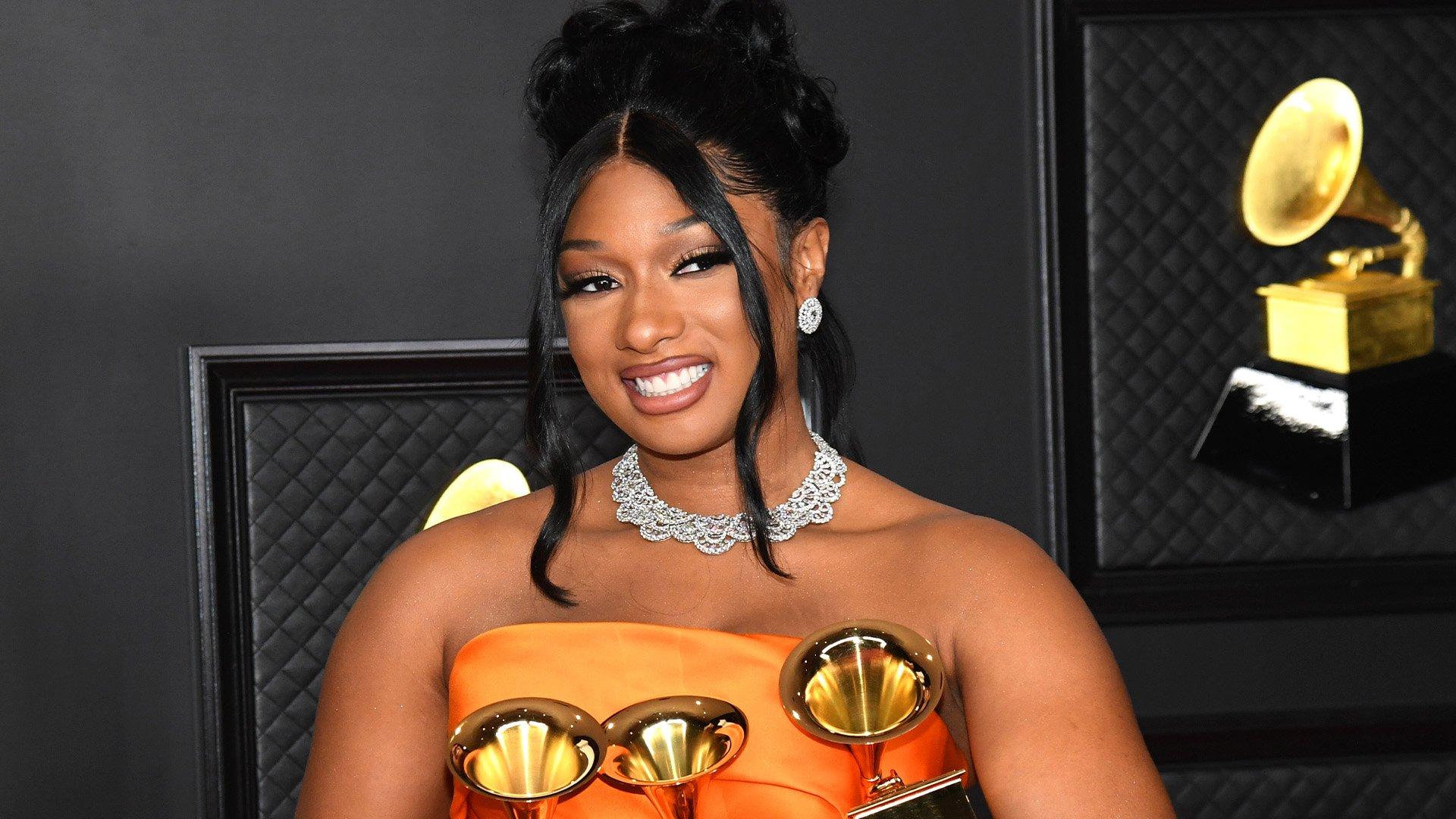
Photo: Kevin Mazur/Getty Images for The Recording Academy
video
GRAMMY Rewind: Megan Thee Stallion Went From "Savage" To Speechless After Winning Best New Artist In 2021
Relive the moment Megan Thee Stallion won the coveted Best New Artist honor at the 2021 GRAMMYs, where she took home three golden gramophones thanks in part to her chart-topping smash "Savage."
In 2020, Megan Thee Stallion solidified herself as one of rap's most promising new stars, thanks to her hit single "Savage." Not only was it her first No. 1 song on the Billboard Hot 100, but the "sassy, moody, nasty" single also helped Megan win three GRAMMYs in 2021.
In this episode of GRAMMY Rewind, revisit the sentimental moment the Houston "Hottie" accepted one of those golden gramophones, for Best New Artist.
"I don't want to cry," Megan Thee Stallion said after a speechless moment at the microphone. Before starting her praises, she gave a round of applause to her fellow nominees in the category, who she called "amazing."
Along with thanking God, she also acknowledged her manager, T. Farris, for "always being with me, being by my side"; her record label, 300 Entertainment, for "always believing in me, sticking by through my craziness"; and her mother, who "always believed I could do it."
Megan Thee Stallion's "Savage" remix with Beyoncé also helped her win Best Rap Song and Best Rap Performance that night — marking the first wins in the category by a female lead rapper.
Press play on the video above to watch Megan Thee Stallion's complete acceptance speech for Best New Artist at the 2021 GRAMMY Awards, and remember to check back to GRAMMY.com for more new episodes of GRAMMY Rewind.
Black Sounds Beautiful: How Megan Thee Stallion Turned Viral Fame Into A GRAMMY-Winning Rap Career
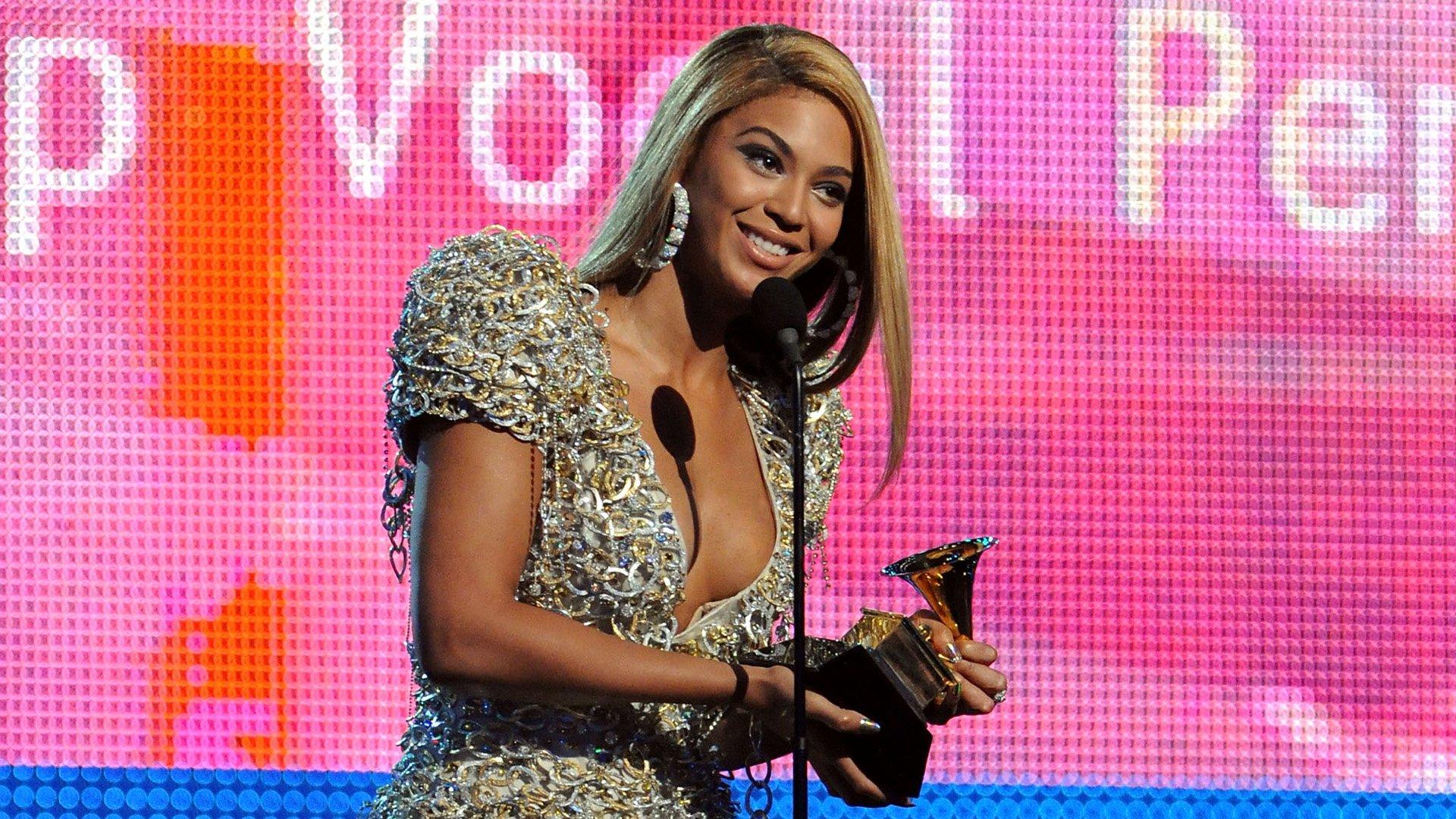
Photo: Jeff Kravitz/FilmMagic
video
GRAMMY Rewind: Watch Beyoncé Win A GRAMMY For "Halo" During Her Record-Setting Night In 2010
As you dive into Beyoncé's new album, 'COWBOY CARTER,' revisit the moment Queen Bey won a GRAMMY for "Halo," one of six golden gramophones she won in 2010.
Amongst Beyoncé's expansive catalog, "Halo" is easily one of her most iconic songs. Today, the 2009 single is her most-streamed song on Spotify; it was her first video to reach one billion views on YouTube; and it helped her set one of her GRAMMY records in 2010.
In this episode of GRAMMY Rewind, watch the superstar take the stage to accept Best Female Pop Vocal Performance for "Halo" in 2010 — the year she became the first female artist to win six GRAMMYs in one night.
"This has been such an amazing night for me, and I'd love to thank the GRAMMYs," she said, admitting she was nervous before taking a deep breath.
Before leaving the stage, Beyoncé took a second to thank two more special groups: "I'd love to thank my family for all of their support, including my husband. I love you. And I'd like to thank all of my fans for their support over the years."
The five other awards Beyoncé took home that night were for the coveted Song Of The Year ("Single Ladies (Put A Ring On It)") and four R&B Categories: Best Contemporary R&B Album (I Am... Sasha Fierce), Best R&B Song ("Single Ladies"), Best Female R&B Vocal Performance ("Single Ladies"), and Best Traditional R&B Vocal Performance (for her cover of Etta James' "At Last").
As of 2024, Beyoncé has won the most GRAMMY Awards in history with 32 wins.
Press play on the video above to relive Queen Bey's "Halo" win for Best Female Pop Vocal Performance, and check back to GRAMMY.com for more new episodes of GRAMMY Rewind.
Enter The World Of Beyoncé
Beyond Country: All The Genres Beyoncé Explores On 'Cowboy Carter'
Beyoncé Is The Genre-Bending Queen On 'Cowboy Carter': 5 Takeaways From Her New Album
Beyoncé's New Album 'Cowboy Carter' Is Here: Check Out The Featured Artists, Cover Songs, And Tracklist
Everything We Know About Beyoncé's New Album, 'Cowboy Carter': Two New Singles, Tracklist, A Shift To Country & More
How Beyoncé Is Honoring Black Music History With 'Cowboy Carter,' "Texas Hold Em," 'Renaissance' & More
Songbook: The Complete Guide To The Albums, Visuals & Performances That Made Beyoncé A Cultural Force
A Timeline Of Beyoncé's GRAMMY Moments, From Her First Win With Destiny's Child to Making History With 'Renaissance'
How Many GRAMMYs Has Beyoncé Won? 10 Questions About The 'Renaissance' Singer Answered

Watch Beyoncé Make GRAMMY History With Her 32nd Win In 2023 | GRAMMY Rewind
6 Takeaways From 'Renaissance: A Film By Beyoncé'
Beyoncé's 'Dangerously In Love' Turns 20: How The Solo Debut Foreshadowed The Singer's Icon Status
5 Takeaways From Beyoncé's New Album 'Renaissance'

How Beyoncé Has Empowered The Black Community Across Her Music And Art | Black Sounds Beautiful

The Creative Rebirth Of Beyoncé On '4' | For The Record
